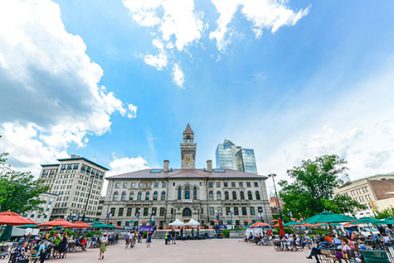
Kaiomi Inniss
Worcester received a ranking of 379 out of 415 places considered for “2018’s Best College Towns and Cities in America” list developed by WalletHub. However, the president of the Worcester Student Government Association (WSGA), Emilee Cucuzzo, disagrees with this ranking and believes that Worcester is heading in the right direction to become a thriving college town.
“A good college town requires more communication between students…and that’s what the WSGA is trying to foster,” Cucuzzo said.
“One City, One Voice” is the motto of the Worcester Student Government Association. The Worcester Student Government Association, founded in 2013 by Holy Cross graduate Neema Hakim, is focused on bridging the gaps between college campuses in Worcester. The association serves the nine colleges and universities within the Worcester consortium — Anna Maria College, Assumption College, Becker College, Clark University, College of the Holy Cross, Massachusetts College of Pharmacy and Health Sciences – Worcester, Worcester State University and Worcester Polytechnic Institute. In the Fall of 2017, WSGA sent out a survey to these nine campuses to gather data on student life and overall satisfaction with the city.
“As a collective body of the WSGA, we can only speak from certain perspectives, so we wanted a more widespread perspective of students… and what they needed in Worcester,” said Cucuzzo.
The survey addressed transportation, safety and entertainment. In January, WGSA met with Worcester Mayor Joe Petty and City Manager Ed Augustus to present its findings. The results have also gone out to the Chamber of Commerce and the Worcester Regional Research Bureau. The WGSA hopes to foster more collaboration between students across campuses and create a mobilization of students to change the culture and the future of the city.
“The real hope is to show them this is what students want,” Cucuzzo said.
Transportation
While more students feel it’s easy to access downtown (43 percent) than those who do not (31 percent), more than 86 percent of students have never used Worcester public transportation. The number of students who use the Worcester Regional Transit Authority’s bus service more than six times per month is staggeringly low (2 percent), despite colleges like Clark offering discounted bus passes for students. Several students use their own cars or ride-share services such as Uber and Lyft. Holy Cross has teamed up with Uber to offer students discounted rides.
“It seems like Clark would be more likely to have that kind of initiative [discounted bus passes] as opposed to Holy Cross, where they don’t have direct access to a bus line,” Cucuzzo said.
With the WRTA facing a $900,000 deficit and proposing to implement service cuts, the picture remains bleak.
Last fall, the bike share company, Ofo, launched in Worcester, giving discounted rides to college students. Cucuzzo believes that these types of initiatives highlight the city’s desire for students to be able to access downtown and other areas. However, several students are reluctant to use Ofo without a more reliable bike infrastructure in place.
“It’s more of creating an event or something that pushes students to get off campus and find their own means of transportation…we have to find a way to find transportation that students would use,” Cucuzzo said.
Safety
Despite the significant decline in violent crime in Worcester, 35 percent of students felt that Worcester was unsafe, which was higher than those who thought it was safe.
“I think the main reason is perception,” Cucuzzo said. “I think it’s for students to look at it objectively and see that there isn’t as many violent crimes happening, and you have to be open and explore and push yourself off campus to see that.” Due to Worcester’s previous high crime rates, several students arrive thinking that Worcester is an unsafe city, and this stigma persists.
“A lot of these students have never lived in or experienced an urban setting, so they automatically deem it as unsafe,” said Christian Rentsman, a Clark senior.
The city has been tackling crime through many initiatives such as pushing for more police integration with the community and investing in public parks.
Entertainment
More than 45 percent of students do not attend events off-campus, and only 49 percent attend events off-campus one to three times a month. The most popular events among students are Shrewsbury College Shuffle, StART on the Street and events at the DCU Center. Forty-four percent of students felt uninformed about events in Worcester. The WSGA collaborated with Clark University’s Office of Student Leadership and Programming (SLP) to include Worcester events in the weekly “What’s Happening” emails sent out by Allie Shilling, the associate director of SLP. The survey also asked students to list events they would like to see downtown, and the responses included more cultural events with food, festivals, parades and music events. Several students also indicated the desire to have more 18+ events in the downtown area.
Moving Forward
Overall, most students (55 percent) are satisfied with living in Worcester.
“The city is a great place to be a college student because of the potential and opportunities it provides,” Cucuzzo said.
The Worcester Student Government Association promises to use these results to collaborate with the city and continue to be the voice of students in Worcester. For more information, visit worcestersga.org.
Photograph courtesy of Discover Central Massachusetts






